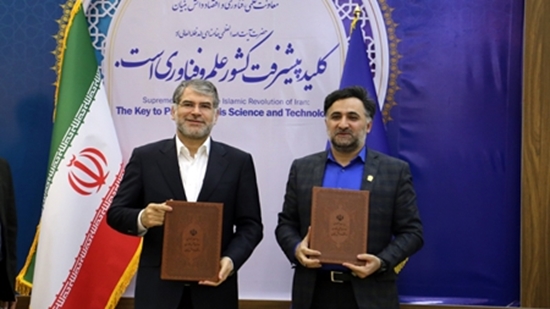Achieving food security by developing smart agriculture; Dehghani: Knowledge-based companies bring the food value chain to evolution and maturity
The joint cooperation agreement in the field of food security was signed by the vice president of science, technology and knowledge-based economy and the minister of agricultural jihad.

Cooperation agreement with the aim of creating an entrepreneurial ecosystem in the field of food security and the creation and development of productive agricultural settlements with priority for the development of greenhouse and fishery settlements with an estimated 5-year value creation of at least 50 to 100 thousand billion Tomans was signed by Ruhollah Dehghani, Vice President of Science, Technology and Knowledge-Based Economy and Seyed Javad Sadatinejad, Minister of Agricultural Jihad.
At the signing ceremony of this agreement, Dehghani praised the effective cooperation of the Ministry of Agricultural Jihad along with the Supreme Leader's emphasis on achieving food security and said: "The Ministry of Agricultural Jihad has made a good and effective effort in the direction of food security." One of the most important examples of knowledge-based economy is the food value chain.
The vice president of science, technology and knowledge-based economy emphasized that attention should be paid to all parts of the food value chain, and continued: from licenses to provide land for innovative cultivation, having a cultivation pattern based on standards, complexes that monitor these priorities and strategies, and knowledge-based and technology companies are all in this value chain.
Emphasizing that scientific care should be taken in the mentioned process, he said: In this process, education plays an important role. Creating a series of small greenhouses, after some time, will form greenhouse settlements, which will eventually become brands, and the land of these greenhouses will find their real value.
Maybe this complexes does not exceed a thousand hectares, but it can be a model that promotes knowledge-based work in the field of agriculture.
Development of smart and indigenous greenhouses
Seyyed Javad Sadatinejad, Minister of Jihad Agriculture, also pointed to the development of the model of native greenhouses and said: Localization and development of smart greenhouses is a model that we follow with the cooperation of knowledge bases. Stylization and cheapening of the greenhouse is one of the important and priority cases in which the scientific assistant can play a role.
The Minister of Jihad Agriculture pointed out that one of the weaknesses in the field of smart agriculture is the issue of investment and continued: the share of agriculture in the gross domestic product is over 11%, while the amount of investment in this field is 4%. This shows that the incentive to invest in agriculture should be increased and investors from other sectors should be encouraged to invest in agriculture.
He added: The agricultural sector has profitable sectors, one of which is aquaculture, whose profitability will be far more profitable than some industries.
Sadatinejad considered the field of horticulture as one of the great and lesser-known capacities of domestic agriculture and said: Horticulture is one of the profitable sectors that we need to pay attention to as an economic and money-making axis.
The Minister of Jihad of Agriculture stated: I appreciate the Vice Presidency of Science, Technology and Knowledge-based Economy who paid special attention to the field of agriculture and responded to this concern and emphasis of the Leader of the Revolution. This field has a lot of potential and can bring valuable achievements.
In another part of this ceremony, Hamid Zulfaghari, acting deputy of knowledge-based economy development, introduced the national plan for the creation and development of productive and knowledge-based greenhouse and fishery settlements.
Hossein Mollazadeh, the secretary of the digital economy and intelligence technology development staff, also presented a report on the intelligent agricultural system.
The axes of the memorandum
Designing, locating, creating, developing and improving the performance of productive and knowledge-based greenhouse settlements and the cultivation of agricultural products in controlled environments in the amount of 2400 hectares, with a focus on vegetable and summer production, flower production, ornamental plants and tropical fruits are among the main axes of this agreement.
Supporting the creation and development of greenhouse units by investors and major owners in the amount of at least 1000 hectares, the creation and development of 4 greenhouse towns each in the amount of at least 400 hectares; Design, placement, creation, development and improvement of the performance of shrimp farms and other 16,000 hectares of aquaculture and the development of shrimp and other aquatic farms by investors and major owners to the extent of at least 5,000 hectares, the creation and development of a knowledge-based breeding city for shrimp and other aquatic species with the priority of breeding units, weighing and productive larval production farms at a level of at least 1,000 hectares in the form of consortia including the financing institution, the exploiting company and the technology companies with the priority of attracting and using small capitals, activating and improving the productivity and performance of the existing shrimp and other aquatic farms by using technologies with high commercialization capability to the extent of at least 2000 hectares in agricultural settlements and 8000 Hectares outside the settlements, along with the design, creation and development of fish and other aquatic farms in the sea at the rate of 5000 tons per year with the approach of protected and safe zones, are among the other axes of this cooperation memorandum.






 adress : No. 209 , between Navab Str and Roudaki Str. Azadi Str. Tehran - Iran
adress : No. 209 , between Navab Str and Roudaki Str. Azadi Str. Tehran - Iran  phone: +98 21 63478000
phone: +98 21 63478000
نظر دهید